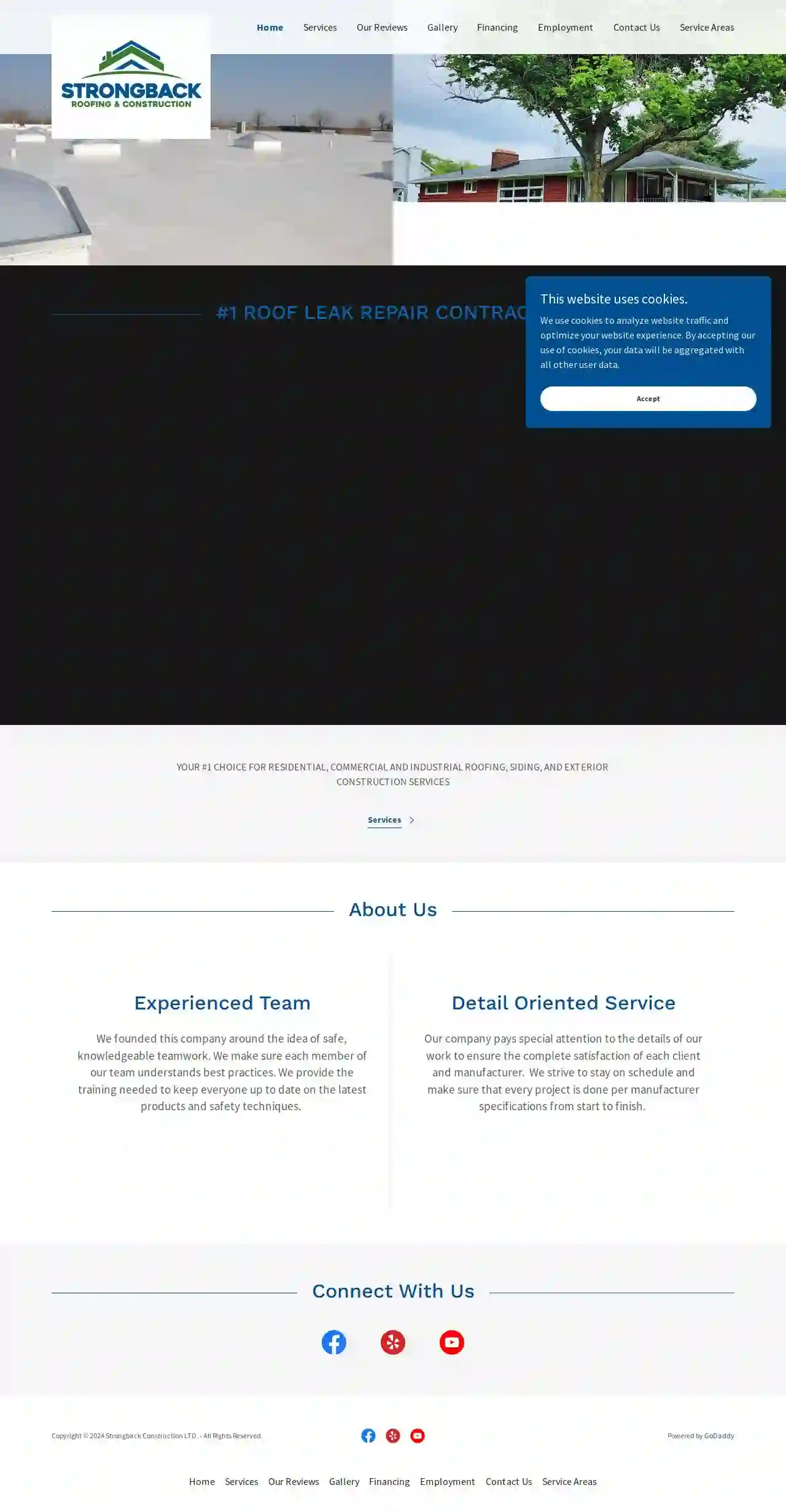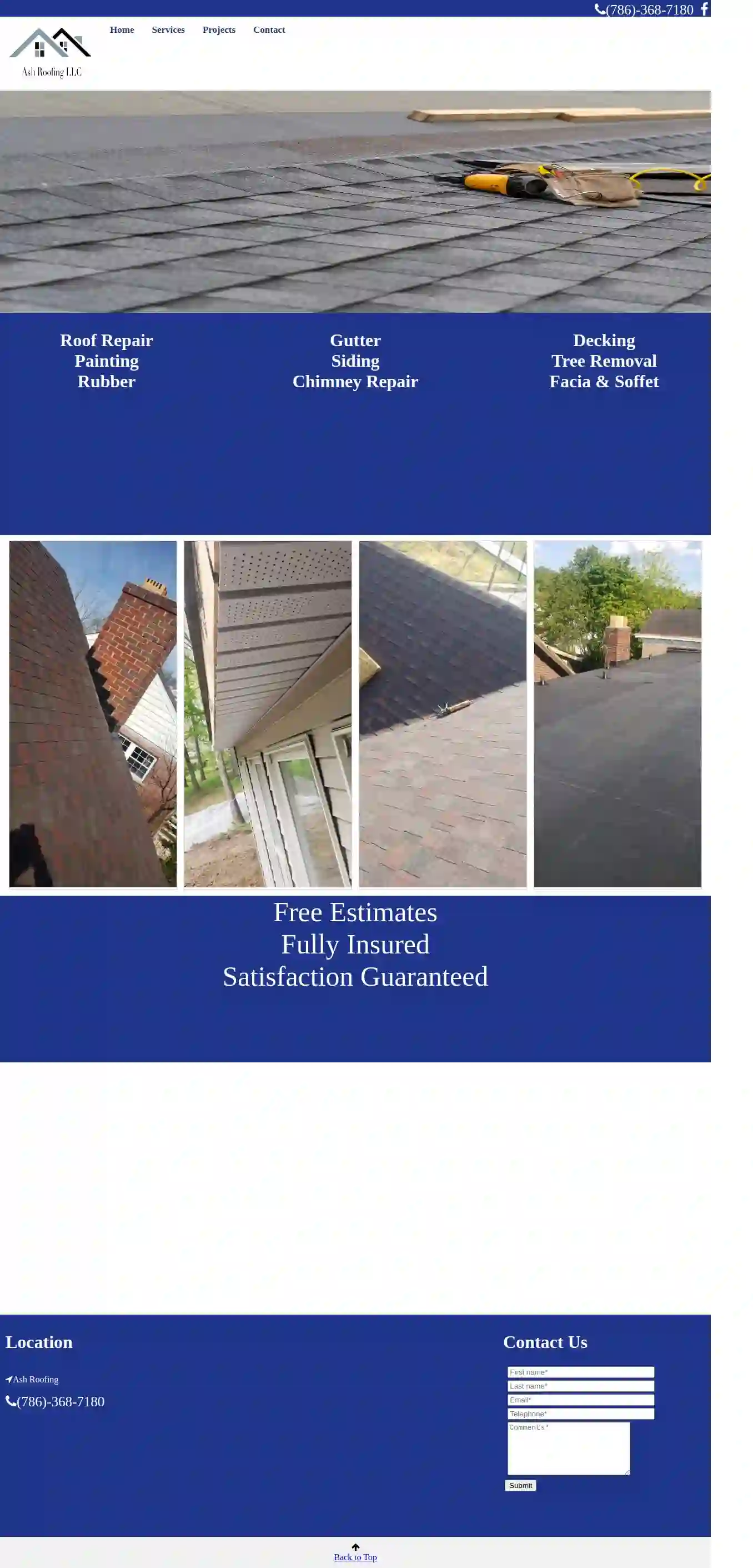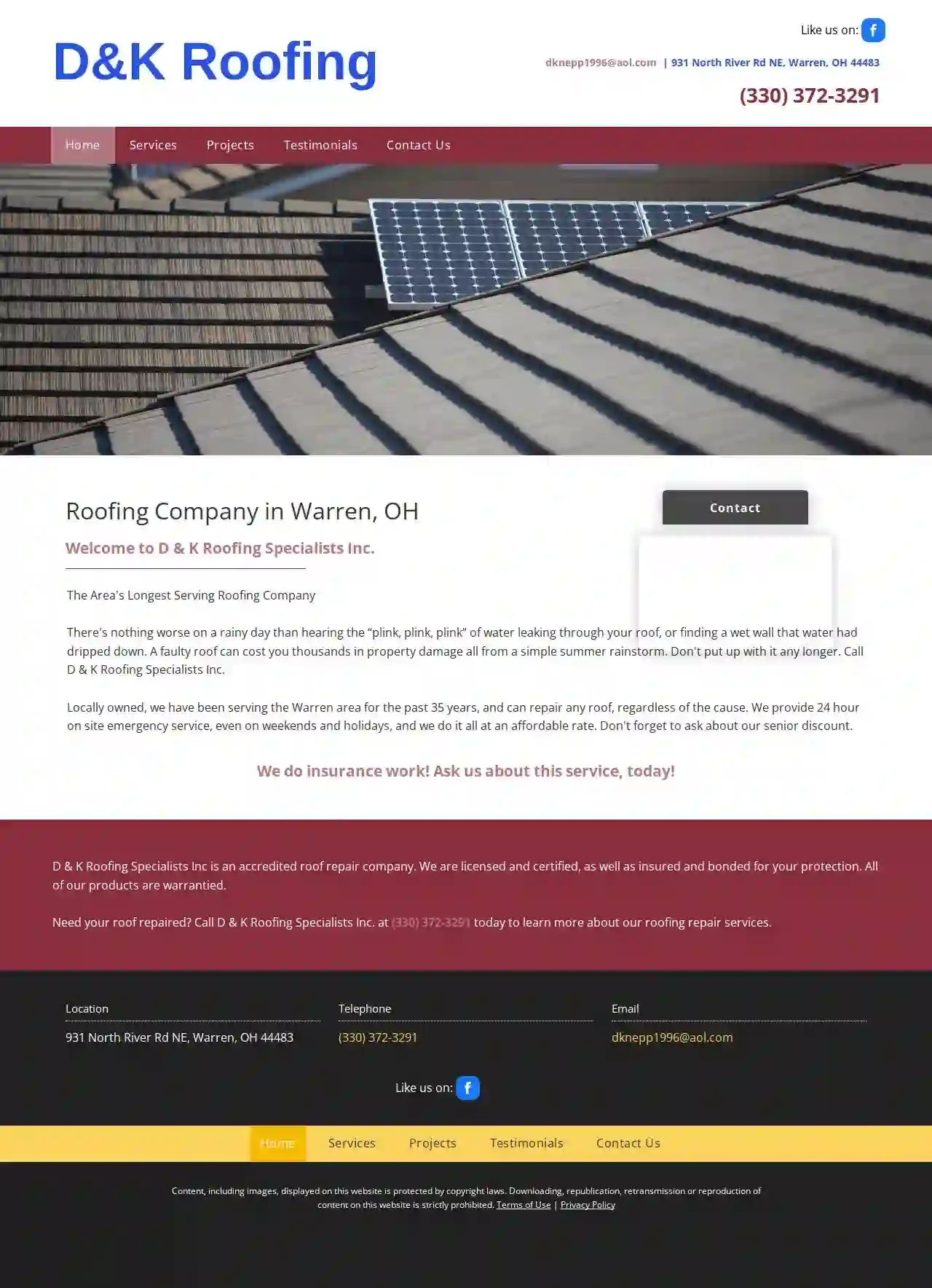Roofing Companies Shaker Heights
Find Roofing Contractor in Shaker Heights
Get up to 3 Roofing Services quotes for your project today! Compare profiles, reviews, accreditations, portfolio, etc... and choose the best deal.

Dahm Brothers Roofing
4.616 reviews743 Valley Street, Dayton, 45404, USDahm Brothers Co., Inc. is a full-service, family-owned roofing company proudly giving service to the Dayton, Ohio and surrounding areas since 1926. "A Dayton Tradition" - offering new roofs, roofing repairs, wind and storm damage, hail damage, re-roof and more. We specialize in residential roofing projects for repair, maintenance service along with roof inspections. Our team is highly skilled, certified and fully insured.
- Services
- Why Us?
- Our Team
- Testimonials
- Gallery
Get Quote
Copeland Roofing & Siding, Inc.
4.494 reviewsBeaverceek, Ohio, 4080 Dayton-Xenia Road, Dayton, 45432, USHere at Copeland Roofing & Siding, Inc. we are the premier Dayton roofing company. We strive to provide the best roofing experience possible. We can achieve that through our excellent craftsmanship and our extended warranty shingles. We have been serving the Dayton Ohio area since 1965. We are looking forward to being the next roofer to service your residential or commercial location.
- Services
- Why Us?
- Gallery
Get Quote
unlimited roofing and masonry
52 reviews89 Hillside Ave, Newark, 07108, USUnlimited Roofing and Masonry is a company dedicated to providing top-notch roofing and masonry services. They specialize in a wide range of services, including roof installation, replacement, and repairs, as well as stone masonry, foundation repair, stone veneer, mortar repair, chimney services, basement waterproofing, tuckpointing, pressure washing, and stucco. The company prides itself on its expertise, using the best equipment and materials to ensure quality and durability. They are committed to customer satisfaction and strive to exceed expectations with every project. Unlimited Roofing and Masonry is your trusted partner for all your exterior solutions.
- Services
- Why Us?
- Testimonials
- Gallery
Get Quote
M & C Construction
4.537 reviewsSuite 3, 1305 Boardman Canfield Rd., Boardman, 44512, USM&C Construction, LLC is a customer-oriented company offering a variety of exterior home services, including roofing, vinyl siding, window installation, and storm damage repair. With offices in Ohio, South Carolina, and Pennsylvania, they provide reliable construction services such as storm damage repair, roof repair and replacement, window installation, vinyl siding, remodeling, and new construction.
- Services
- Why Us?
- Gallery
Get Quote
J & M Roofing LLC
1000 E High Ave, New Philadelphia, 44663, USJ&M Roofing LLC is a trusted commercial roofing contractor serving businesses in Ohio and surrounding areas like New Philadelphia, Akron, Canton, Northern West Virginia, and Western Pennsylvania. We specialize in providing reliable and cost-effective roofing solutions, including repair, replacement, restoration, and coatings. Our team of licensed and trained professionals is dedicated to helping business owners like you achieve peace of mind through our unique Conklin roofing services. We understand the stress and expense that roof problems can cause. That's why we offer a range of solutions designed to extend the lifespan of your roof, prevent leaks, save you money on energy costs, and provide long-term value. Our Conklin roofing systems are highly reflective, blocking up to 84% of the sun's UV rays, and are backed by non-prorated, 100% leak-free warranties that can be renewed with a simple recoat. At J&M Roofing, we believe in personalized service, adhering to the highest standards, and delivering affordable solutions. We're committed to providing you with the best possible roofing experience from start to finish.
- Services
- Why Us?
- Accreditations
- Our Team
- Testimonials
- Gallery
Get Quote
Strongback Roofing and Construction
510 reviews2407 Cleveland Avenue Northwest, Canton, 44709, US#1 ROOF LEAK REPAIR CONTRACTOR YOUR #1 CHOICE FOR RESIDENTIAL, COMMERCIAL AND INDUSTRIAL ROOFING, SIDING, AND EXTERIOR CONSTRUCTION SERVICES Services About Us Experienced Team Detail Oriented Service We founded this company around the idea of safe, knowledgeable teamwork. We make sure each member of our team understands best practices. We provide the training needed to keep everyone up to date on the latest products and safety techniques. Detail Oriented Service Detail Oriented Service Our company pays special attention to the details of our work to ensure the complete satisfaction of each client and manufacturer. We strive to stay on schedule and make sure that every project is done per manufacturer specifications from start to finish. Connect With Us
- Services
- Why Us?
- Accreditations
- Gallery
Get Quote
Ash Roofing
4.99 reviewsCincinnati, USAsh Roofing is your trusted partner for all your roofing needs. We offer a comprehensive range of services, from roof repair and painting to gutter installation and chimney repair. Our team of experienced professionals is dedicated to providing high-quality workmanship and exceptional customer service. We are fully insured and guarantee your satisfaction. Whether you need a minor repair or a complete roof replacement, Ash Roofing has the expertise and resources to get the job done right. We use only the highest quality materials and the latest roofing techniques to ensure your roof is durable, reliable,s and aesthetically pleasing. Contact us today for a free estimate and let us help you protect your home.
- Services
- Why Us?
- Gallery
Get Quote
D & K Roofing Specialists Inc
422 reviews931 North River Rd NE, Warren, 44483, USWelcome to D & K Roofing Specialists Inc., the Area's Longest Serving Roofing Company. There's nothing worse on a rainy day than hearing the “plink, plink, plink” of water leaking through your roof, or finding a wet wall that water had dripped down. A faulty roof can cost you thousands in property damage all from a simple summer rainstorm. Don't put up with it any longer. Call D & K Roofing Specialists Inc. Locally owned, we have been serving the Warren area for the past 35 years, and can repair any roof, regardless of the cause. We provide 24 hour on site emergency service, even on weekends and holidays, and we do it all at an affordable rate. Don't forget to ask about our senior discount. We do insurance work! Ask us about this service, today! D & K Roofing Specialists Inc is an accredited roof repair company. We are licensed and certified, as well as insured and bonded for your protection. All of our products are warrantied.
- Services
- Why Us?
- Accreditations
- Gallery
Get Quote
Top Armor Roofing Inc
58 reviews717 Lakefield Road Unit C, Westlake Village, 91361, USTop Armor Roofing Inc is a family owned and operated, highly reviewed, roofing company serving the Conejo Valley and surrounding areas for over 35 years. We are a licensed and insured team of highly qualified residential roof replacement, repair and maintenance professionals. We are also a preferred partner of multiple HOA and multi-family dwelling associations. We pride ourselves on quality of work, reliability, timeliness, and personable people. We take pride in our 5 star rating and see each job as an opportunity to inspire another great review. We offer a wide range of services including roof repair & service, roof restoration, roof replacement, emergency roof repair, roof maintenance, and storm/fire damage prevention.
- Services
- Why Us?
- Accreditations
- Our Team
- Testimonials
- Gallery
Get Quote
Golden A Roofing
Maumee, USGolden A Construction LLC is a licensed and insured construction company, specializing in storm damage repair and roofing services, backed by over 20 years of industry experience and a commitment to quality and customer satisfaction.
- Services
- Why Us?
- Gallery
Get Quote
Over 17,196+ Roofing Companies registered
Our roofing contractors operate in Shaker Heights and surroundings!
Roofyng.com has curated and vetted the Best Roofing Contractors near Shaker Heights. Find the most trustworthy contractor today.
Frequently Asked Questions About Roofing Companies
- Home Improvement Loans: Offered by banks or credit unions.
- Home Equity Loans or Lines of Credit: Use your home's equity as collateral.
- Government Programs: Check for energy efficiency rebates or grants.
- Contractor Financing: Some roofing companies offer financing plans.
- Experience: 'How long have you been in business, and what experience do you have with similar projects?'
- Licensing and insurance: 'Are you licensed and insured, and can I see proof of coverage?'
- Warranties: 'What warranties do you offer on your work and the materials used?'
- References: 'Can you provide references from past clients?'
- Project Timeline: 'What is the estimated timeline for completing the project?'
- Payment Terms: 'What are your payment terms, and do you require a deposit?'
- Communication: 'How will you keep me updated on the project's progress?'
- Cleanup: 'What steps will you take to protect my property during the project and ensure proper cleanup afterward?'
How can I get financing for a new roof?
What is a roof valley, and why is it important?
What should I do with my old roof after replacement?
What questions should I ask a roofing contractor?
How can I get financing for a new roof?
- Home Improvement Loans: Offered by banks or credit unions.
- Home Equity Loans or Lines of Credit: Use your home's equity as collateral.
- Government Programs: Check for energy efficiency rebates or grants.
- Contractor Financing: Some roofing companies offer financing plans.
What is a roof valley, and why is it important?
What should I do with my old roof after replacement?
What questions should I ask a roofing contractor?
- Experience: 'How long have you been in business, and what experience do you have with my type of roof?'
- Licensing and insurance: 'Are you licensed and insured, and can I see proof of coverage?'
- Warranties: 'What warranties do you offer on your work and the materials used?'
- References: 'Can you provide references from past clients?'
- Project Timeline: 'What is the estimated timeline for completing the project?'
- Payment Terms: 'What are your payment terms, and do you require a deposit?'
- Communication: 'How will you keep me updated on the project's progress?'
- Cleanup: 'What steps will you take to protect my property during the project and ensure proper cleanup afterward?'